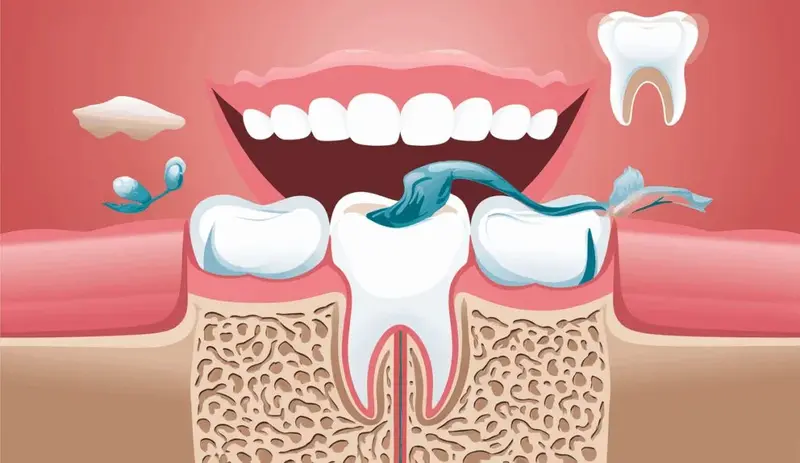
You’re enjoying your morning coffee, and suddenly-ouch! A sharp, uncomfortable zap of pain shoots through your tooth. Maybe it happens with hot tea, or even when you bite into something cold.
What’s going on, and should you be worried? Tooth sensitivity isn’t just annoying-it’s your mouth’s way of sending an important message. This guide will help you understand why your teeth are feeling extra sensitive and what steps you can take to find relief.
What Exactly Is Tooth Sensitivity?
The sudden, sharp twinge of pain that most people experience when they sip a hot coffee or bite into an ice cream cone is understood by few. Most think of it as a random, uncomfortable moment, but it’s really the tooth’s protective layer sending a message. This is like the warning light on your car’s dashboard, signaling that something needs attention.
The hard outer layer of your teeth, enamel, serves as a shield against temperature shifts and outside irritants. When this protective barrier gets compromised, your tooth becomes more reactive to hot, cold, sweet, or acidic foods and drinks. It’s your mouth’s way of saying, “Hey, something isn’t quite right here.”
Common Causes of Hot and Cold Sensitivity
There can be several reasons for tooth sensitivity. The most common is that you have enamel that is worn down. Enamel can wear down through many means. The most common are:
• Brushing too hard • Food and drink that are too acidic • Grinding your teeth • Just getting older
Teeth that are cracked can lead to pathways for temperature and sensation to penetrate more deeply. Small pathways that won’t reach the nerve center of the tooth can still feel like crackling inside your tooth.
The tiny pathways created by minimal decay don’t have access to the tooth’s main nerve, but you can still feel the imperfection. If your teeth are cracked and/or small pathways are leading to nerve irritation, you may notice these signs as indicators that your sensitivity is about to go to a new level.
When Sensitivity Means You Need Professional Help?
Tooth sensitivity isn’t usually something to get alarmed about, but some signs indicate a dentist visit is warranted. Here in Houston, TX, we’ve seen countless patients who persistently complain about toothaches but don’t consider them serious enough to warrant a dental consultation. Those same patients often return to us months later with more serious dental problems that could have been nipped in the bud.
If you experience the following, pay attention:
• More than a few days of pain
• Everyday eating and drinking interrupted by sensitivity
• Accompanied by swelling or bleeding in your mouth, teeth, or jaw, pain that persists and is intense enough to stop you in your tracks
Seeing your gums bleed regularly? They might be trying to tell you something.
Here’s a look at some causes of bleeding gums:
- Poor dental hygiene
- Gum disease
- Certain blood disorders
- Pregnancy
- Certain medications
Simple Ways to Reduce Tooth Sensitivity
Tooth sensitivity management and reduction can be facilitated with a range of strategies. Toothpaste designed for immediate relief can be a helpful first-line strategy to use. These special formulations help send a different kind of signal from the tooth surface to the nerve, which is presumably the reason for the relief.
Brushing gently is so very important. You need to use a toothbrush with soft bristles, and you mustn’t scrub too hard, which can not only cause your gums to recede but can also cause your enamel to wear down even more. If you are someone who grinds their teeth at night, you might benefit from a nightguard to protect the surfaces of your teeth.
Changes in what you eat can also help. Avoid food and drinks that are extremely hot or cold, and introduce temperature variations gradually. Eat or drink acidic food and drink in moderation and, whenever possible, through a straw.
Prevention Is Always Better Than Treatment
Your best defense against tooth sensitivity is regular dental checkups at LifeWorks Dental. A professional can catch the earliest signs of enamel erosion, gum recession, or developing decay and stop them from becoming big problems.
Key to maintaining good oral hygiene:
• Brush two times each day
• Floss on a regular basis
• Use toothpaste that contains fluoride
• Keep yourself hydrated
• Have a well-balanced diet
Your general well-being is clearly reflected in your oral health. It is important to notice even the slightest of changes in your mouth and to act fast and in a purposeful manner to keep your oral health going strong and maintain that sensitivity-free smile of yours.
We suggest that for particular worries or individualized guidance, you get in touch with your nearby dental expert. Visit our Google Maps location to find us easily and schedule a consultation.
Final Words
Tooth sensitivity isn’t something you have to live with. It’s a signal from your body that needs attention—and often, a simple fix can make a big difference. Our Houston dental team is always ready to help you understand and resolve your dental concerns.






